Melatonin and Body Dysmorphic Disorder: Restoring Healthy Sleep Patterns
Introduction
Sleep plays a profound role in mental health, emotional regulation, and body perception. For people living with Body Dysmorphic Disorder (BDD), however, restful sleep often feels out of reach. The same obsessive and anxious thought patterns that dominate waking life can continue into the night—keeping the mind on high alert and preventing the body from fully resting.
Over time, this cycle of insomnia and rumination worsens emotional distress, increases cortisol levels, and even amplifies body image distortions. But at the center of this problem lies a key biological factor: melatonin, the hormone that governs the sleep-wake cycle.
When melatonin rhythms are disrupted, the body loses its natural sense of when to rest and when to be alert. The good news is that melatonin can be both restored and supported—through mindful habits, supplement use, and nervous system balance. This article explores the science of melatonin, its connection to BDD-related sleep issues, and how restoring this crucial hormone can help calm the mind and reset healthy sleep patterns.
Looking for supplements for This? Click here.
The Role of Sleep in Emotional Regulation 🌙💤
Sleep isn’t just rest—it’s repair. During deep and REM sleep, the brain consolidates memories, processes emotions, and clears out stress-related byproducts that accumulate during the day.
For people with BDD, whose days are filled with intrusive thoughts and emotional tension, sleep is vital for regulating anxiety and maintaining perspective. But when sleep becomes fragmented or insufficient, the amygdala—the brain’s fear center—becomes hyperactive, while the prefrontal cortex—the rational, regulating part—loses efficiency.
The result? Emotional volatility, exaggerated body-image fears, and a mind that struggles to distinguish between reality and distortion.
Restoring healthy sleep isn’t just about feeling less tired—it’s about rebuilding emotional resilience. And melatonin is at the center of this equation.
What Is Melatonin? 🌙✨
Melatonin is a hormone naturally produced by the pineal gland, a small structure deep within the brain. Its release is triggered by darkness and suppressed by light.
In essence, melatonin acts as the body’s internal clockkeeper—helping signal when it’s time to wind down. Beyond sleep, melatonin also helps regulate:
Core body temperature
Blood pressure and metabolism
Immune function
Antioxidant defense systems
In a healthy rhythm, melatonin levels rise in the evening, peak during the night, and gradually decline toward morning. But in people under chronic stress—especially those with disorders like BDD—this rhythm can be severely disrupted.
The Connection Between BDD, Stress, and Sleep Disruption ⚡
Body Dysmorphic Disorder doesn’t only affect thoughts—it affects the autonomic nervous system. The constant self-surveillance and internal criticism keep the body stuck in a state of sympathetic activation, commonly known as “fight or flight.”
When this happens, cortisol (the stress hormone) remains elevated, directly interfering with melatonin production. Cortisol and melatonin work in opposition:
When cortisol is high, melatonin stays low.
When melatonin is high, cortisol naturally drops.
Chronic worry about appearance—especially at night when the mind is quiet—can maintain high cortisol levels even after dark. This keeps melatonin suppressed, leading to:
Difficulty falling asleep
Nighttime awakenings
Restlessness and muscle tension
Morning fatigue despite long hours in bed
Over time, the lack of restorative sleep deepens the emotional instability that drives BDD’s obsessive cycles.
The Science of Melatonin and the Brain 🧬
Melatonin doesn’t just regulate sleep—it interacts with serotonin, the neurotransmitter responsible for mood and self-perception. In fact, serotonin is the direct biochemical precursor to melatonin.
When serotonin levels are low—common in people with anxiety, depression, and BDD—the body may struggle to produce adequate melatonin. This creates a feedback loop: poor serotonin leads to poor melatonin, and poor melatonin leads to poorer serotonin conversion, because deep sleep is when the brain replenishes neurotransmitters.
Additionally, melatonin receptors exist throughout the brain, including in regions linked to emotion, attention, and memory. This suggests that melatonin plays a much broader role than simply “making you sleepy.” It helps regulate emotional memory and supports cognitive flexibility—two abilities that are often compromised in body image disorders.
How Melatonin Affects Body Perception and Self-Image 🌜🪞
One of the lesser-known effects of melatonin is its impact on body awareness and sensory processing. Poor sleep disrupts proprioception—the brain’s internal “map” of the body—and alters how visual information is interpreted.
This might explain why people with BDD report feeling disconnected from their physical form or hyperfocused on small perceived flaws after sleepless nights. Studies show that lack of sleep exaggerates emotional reactivity to visual stimuli, meaning someone may perceive themselves more negatively simply because they’re tired.
By restoring proper melatonin rhythms and improving sleep quality, the nervous system becomes more balanced. This helps recalibrate how the brain interprets body-related information—supporting more neutral, less emotionally charged self-perception.
Symptoms of Low Melatonin or Disrupted Circadian Rhythm 🌙
If you live with BDD and suspect your sleep cycle is off, the following signs may indicate low melatonin production or circadian rhythm disruption:
Difficulty falling asleep (lying awake for over 30 minutes)
Waking up multiple times during the night
Feeling unrefreshed after 7–8 hours in bed
Increased anxiety or irritability at night
Late-night mental chatter or body-checking urges
Energy crashes and mood dips during the day
Cravings for caffeine or sugar to stay alert
Addressing melatonin imbalance can make a remarkable difference—not just for sleep but for daytime mood and emotional regulation.
Melatonin Supplements: How They Work 🌿💊
When taken as a supplement, melatonin acts as a timing signal rather than a sedative. It tells the body, “It’s time to rest,” supporting the natural cascade of relaxation and temperature drop that leads to sleep.
Unlike prescription sleep aids, melatonin doesn’t force sleep—it encourages the body’s own rhythm to resume.
Here’s how melatonin works at a glance:
Within 30 minutes of ingestion, melatonin enters the bloodstream and crosses the blood-brain barrier.
It binds to MT1 and MT2 receptors in the brain, signaling the onset of night.
Core body temperature drops slightly, reducing alertness.
The body’s production of wakefulness hormones (like cortisol and adrenaline) slows down.
This creates the physiological foundation for natural, restful sleep.
Dosage and Timing: Getting It Right ⏰
When it comes to melatonin, less is more. Many people mistakenly take high doses (5–10 mg) and experience grogginess or vivid dreams. The body only produces about 0.3 mg of melatonin naturally per night, so small supplemental doses are often sufficient.
Typical dosage range:
0.3 to 1 mg for mild insomnia or circadian rhythm support
2–3 mg for moderate sleep disturbances
Higher doses (5 mg or more) should only be used short-term or under medical supervision
Timing matters:
Take melatonin 30–60 minutes before bedtime.
Dim the lights and avoid screens after taking it, since blue light suppresses melatonin production.
Consistency is key—taking it at the same time each night helps retrain the body’s clock.
Combining Melatonin with Other Calming Nutrients 🌿🌜

While melatonin is powerful on its own, its effects can be amplified when paired with other natural compounds that support relaxation and neurotransmitter balance.
Magnesium Glycinate – Helps relax muscles and reduce cortisol, making it easier for melatonin to take effect.
L-Theanine – Promotes alpha brain waves and calm focus, easing nighttime anxiety.
GABA or PharmaGABA – Enhances inhibitory signaling, quieting overactive thought patterns.
5-HTP – Boosts serotonin production, indirectly supporting melatonin synthesis.
Ashwagandha – Reduces evening cortisol levels, improving the quality of sleep.
A combined supplement stack targeting both stress and circadian health can help restore equilibrium in the body and mind.
Looking for supplements for This? Click here.
Melatonin and the Nervous System: Finding Safety at Night 🌙🧘
Many people with BDD struggle to feel safe in their own bodies. Nighttime—when distractions fade—can amplify this unease. Melatonin helps by activating the parasympathetic nervous system, the body’s “rest and digest” mode.
This shift allows:
Heart rate and blood pressure to lower
Breathing to slow and deepen
Muscles to relax
Emotional processing to begin
Essentially, melatonin tells the body, “You can stop fighting now.” This biochemical message of safety is vital for individuals whose anxiety keeps them on high alert, even in silence.
Natural Ways to Boost Melatonin Production 🌿🌙
Before reaching for a supplement, it’s worth supporting the body’s own melatonin synthesis. Small, consistent habits can make a major difference:
Reduce Blue Light Exposure
Avoid screens 1–2 hours before bed. Blue light from phones and laptops suppresses melatonin release by up to 80%. Use “night shift” or amber filters when necessary.
Prioritize Natural Light During the Day
Exposure to sunlight early in the morning helps regulate melatonin production later at night. The brain uses daylight cues to set the rhythm for nighttime melatonin release.
Keep a Consistent Sleep Schedule
Going to bed and waking up at the same time daily reinforces circadian alignment, allowing the pineal gland to produce melatonin predictably.
Create a Cool, Dark Sleep Environment
A dark room triggers melatonin release, while cooler temperatures mimic the body’s natural nighttime drop in temperature.
Practice Evening Mindfulness
Stress hormones directly interfere with melatonin production. Meditation, gentle breathwork, or yoga can help lower cortisol before bed.
The Interplay Between Melatonin and Cortisol 🌘☀️
Cortisol and melatonin work like a see-saw—when one is high, the other is low. Ideally, cortisol peaks in the morning to energize you, then drops gradually throughout the day as melatonin rises.
In people with BDD, chronic stress flattens this curve. Cortisol remains high at night, suppressing melatonin and delaying sleep onset. This not only reduces rest but also feeds the emotional dysregulation that BDD thrives on.
Restoring the natural rise-and-fall of these hormones through relaxation techniques, regular schedules, and supplements can re-establish the rhythm of safety and rest that the body craves.
Melatonin, Dreams, and Emotional Processing 🌙💭
Melatonin doesn’t just put you to sleep—it also influences dream quality. During REM sleep, the brain replays and reorganizes emotional experiences. This helps reduce the intensity of distressing memories and improve perspective.
When melatonin levels are low, REM cycles are shorter and less efficient. Emotional memories remain unprocessed, contributing to lingering anxiety and self-criticism.
Some people experience vivid or intense dreams when first taking melatonin. This can actually signal deeper emotional integration, as the brain catches up on REM processing that’s been suppressed by stress.
Can Melatonin Help Heal the Mind-Body Disconnect in BDD? 🌙💫
Body Dysmorphic Disorder often creates a profound disconnection between the mind and the body. Individuals may intellectually know their flaw is minor but feel it as catastrophic. This disconnect is partly fueled by chronic stress, poor sleep, and altered neurochemistry.
Melatonin contributes to repairing that bridge by:
Reducing nervous system hyperarousal
Supporting serotonin balance (which influences body perception)
Enhancing neuroplasticity during REM sleep
Improving emotional regulation and mood stability
Practical Sleep Routine for People with BDD 🌙🕯️
Here’s a holistic routine that integrates melatonin and supportive practices for emotional rest:
1 hour before bed:
Dim lights and switch off screens
Brew calming tea (chamomile, lemon balm, or lavender)
Write down lingering worries to externalize them from the mind
30 minutes before bed:
Take 0.5–2 mg melatonin
Pair with magnesium or L-theanine for relaxation
Practice slow breathing or listen to calming music
At bedtime:
Keep the room dark and cool
Focus on slow exhales to lower heart rate
If racing thoughts arise, gently redirect attention to the breath or a safe visualization
This consistent rhythm helps the brain relearn that night equals rest—not fear.
In this way, melatonin doesn’t just help people with BDD sleep better—it helps them process emotions and rebuild body awareness.
Side Effects and Precautions ⚖️
Melatonin is generally safe when used in low doses for short or moderate periods. However, some individuals may experience:
Morning grogginess (from excessive doses)
Vivid dreams or nightmares
Slight hormonal fluctuations (especially in women)
Headaches or dizziness in rare cases
It’s not recommended for children, pregnant individuals, or those taking certain medications (like antidepressants, anticoagulants, or immunosuppressants) without medical supervision.
Long-term use is best discussed with a healthcare provider, as natural production may adapt over time.
Melatonin and the Bigger Picture: Healing Through Sleep 🌙💛
Restoring melatonin rhythms is about more than fixing insomnia—it’s about rebuilding safety within the body.
When you finally sleep deeply, your mind quiets, your heart rate slows, and your nervous system remembers what peace feels like. For someone with BDD, that feeling of safety is the first step toward emotional repair.
In time, improved sleep leads to clearer thinking, fewer obsessive thoughts, and more space between reaction and reflection. This makes therapy more effective and daily life more manageable.
Sleep becomes the body’s most natural antidepressant, anti-anxiety treatment, and emotional stabilizer—all orchestrated by melatonin.
Final Thoughts: The Healing Power of Night 🌌
In the darkness, healing happens. But for those with Body Dysmorphic Disorder, night can also feel like the hardest time of day. Melatonin offers a bridge—a biological and symbolic way to reclaim nighttime as a place of peace, not panic.
By supporting the body’s circadian rhythm through melatonin, mindfulness, and consistent routines, individuals with BDD can rediscover what true rest feels like. With time, this rest becomes resilience—the kind that helps you wake up not only rested but renewed.
Sleep doesn’t erase pain, but it strengthens the mind to face it with compassion. 🌙✨
Looking for online therapy ? Click Here.
References 📚
Hardeland, R. (2019). Melatonin and neuropsychiatric disorders: From basic mechanisms to treatment. Current Neuropharmacology.
Wichniak, A., Wierzbicka, A., & Jernajczyk, W. (2017). Sleep and melatonin in mood disorders and anxiety. Pharmacological Reports.
Choudhary, D., Bhattacharyya, S., & Bose, S. (2020). Efficacy of Ashwagandha root extract in improving sleep quality and reducing stress. Journal of Ayurveda and Integrative Medicine.
Cardinali, D. P., Srinivasan, V., Brzezinski, A., & Brown, G. M. (2012). Melatonin and its therapeutic applications in sleep disorders and circadian rhythm disturbances. Journal of Pineal Research.
Walker, M. (2017). Why We Sleep: Unlocking the Power of Sleep and Dreams. Scribner.
Roehrs, T., & Roth, T. (2010). Sleep, stress, and emotional regulation. Sleep Medicine Clinics.
Anderson, G., & Maes, M. (2014). Melatonin: An overlooked player in neuroimmune and neuroinflammatory processes. Molecular Neurobiology.
Porges, S. W. (2011). The Polyvagal Theory: Neurophysiological foundations of emotions, attachment, and communication. W. W. Norton & Company.
Lerner, A. B., Case, J. D., & Takahashi, Y. (1958). Isolation of melatonin: The pineal gland hormone that affects skin pigmentation and circadian rhythms. Journal of the American Chemical Society.
Wilking, M., & Korf, H. W. (2018). Melatonin’s role in circadian rhythm regulation and mental health. Frontiers in Behavioral Neuroscience.
Related Posts
-

Why Co-Dependency Feels Draining: Adrenal Fatigue and Supplements That Help
The adrenal glands are small but powerful organs that sit above your kidneys, acting as your body’s built-in stress managers. They produce hormones like cortisol and adrenaline that help regulate energy, mood, and resilience. When they’re overworked from chronic stress or emotional exhaustion, fatigue and imbalance follow. Supporting adrenal health naturally can help restore calm, energy, and hormonal balance. 🌿⚡
-

The Link Between Anxiety, Co-Dependency, and Natural Support
Anxiety feels like living in constant alert mode—your heart races, your thoughts loop, and your body can’t find peace. It’s the nervous system’s way of preparing for danger, even when none exists. Understanding what’s happening in your mind and body is the first step toward calming the storm and restoring balance. 🌿💫
-

Supplements That Support Dopamine and Serotonin in Co-Dependent Patterns
Serotonin is the neurotransmitter of calm, confidence, and contentment. When it’s balanced, you feel peaceful and emotionally grounded. When it’s low, anxiety, mood swings, and emotional dependence take over. By understanding serotonin’s role in emotional health—and how to support it naturally—you can rebuild inner stability, improve relationships, and cultivate lasting happiness from within. 🌞💫
-

How Emotional Exhaustion in Codependency Impacts the Nervous System
The nervous system is the body’s communication network, connecting the brain to every organ and muscle. It regulates stress, mood, and emotion through a delicate balance of electrical and chemical signals. When overwhelmed, it can become dysregulated—leading to fatigue, anxiety, and emotional imbalance. Understanding how to calm and strengthen the nervous system is key to healing from chronic stress and emotional burnout. ⚡🌿
-

What Is Co-Dependency? The Role of Brain Chemistry and Stress
Stress is more than a feeling—it’s a full-body experience that begins in the brain and ripples through every cell. When cortisol surges and the nervous system stays on alert, your body can’t rest or recover. Over time, this constant tension affects energy, focus, mood, and even immune health. Understanding stress chemistry is the first step toward breaking free from burnout and finding calm again. 🌿
-

Creating a Supplement Stack for Motivation, Energy, and Anti-Procrastination
Motivation is the fuel behind every meaningful achievement—but it’s not just about willpower. It’s a mix of mindset, brain chemistry, and momentum. When energy, focus, and purpose align, action feels natural instead of forced. Learn how to harness motivation as a daily state, not a fleeting feeling.
-

Supplements for Building Consistency and Reducing Chronic Procrastination
Biochemistry is the bridge between biology and chemistry—the science of life at the molecular level. It explains how nutrients, hormones, and neurotransmitters interact to create energy, thought, and emotion. From brain function to muscle movement, biochemistry reveals the invisible processes that sustain health, balance, and vitality.
-

GABA and Procrastination: Supporting Calm Focus for Productivity
GABA is the brain’s natural calming messenger—a neurotransmitter that helps slow mental overactivity and ease stress. When GABA levels drop, focus fades, anxiety rises, and procrastination becomes more likely. By supporting GABA through nutrition, lifestyle, and supplements, you can restore calm clarity, improve focus, and take action with steady, balanced energy.
-

Ashwagandha and Procrastination: Lowering Stress to Improve Action
Science is the language of curiosity and discovery. It helps us understand the hidden patterns behind life, energy, and the universe. Through experimentation and critical thinking, science connects imagination to evidence—turning questions into knowledge. Whether through microscopes, molecules, or minds at work, science represents our endless pursuit of truth and innovation.
-

Neurotransmitters and Motivation: Supplements That Support Drive and Focus
Supplements can do more than boost physical health—they can also enhance mental clarity, focus, and motivation. Nutrients like omega-3s, magnesium, B vitamins, and adaptogens help balance neurotransmitters, stabilize mood, and support brain energy. When combined with good sleep, nutrition, and mindful habits, they can transform how your brain performs under stress.
-

How Stress Hormones Like Cortisol Fuel Procrastination (and What Helps)
Blood sugar isn’t just about physical health—it directly impacts focus, mood, and motivation. When glucose levels spike and crash, energy and attention do the same, fueling procrastination and brain fog. Learning how to stabilize blood sugar through balanced meals, mindful habits, and key nutrients helps keep your mind steady, focused, and ready to act.
-

Brain Fog and Procrastination: Supplements for Mental Clarity
Brain fog can turn even simple tasks into mental hurdles. When your thoughts feel slow and unclear, procrastination often follows—making focus and productivity seem impossible. This article explores the biochemical and lifestyle causes of brain fog and reveals the most effective supplements for restoring mental clarity, focus, and sustained energy.
-

The Link Between Low Energy and Procrastination: Can Supplements Help?
Neurochemistry shapes how we think, feel, and act. When neurotransmitters like dopamine, serotonin, and GABA fall out of balance, it can lead to fatigue, anxiety, or lack of motivation—fueling procrastination and low mood. Understanding the brain’s chemical communication system helps us find ways to restore focus, calm, and emotional stability through nutrition, mindfulness, and targeted supplements.
-

Why Do We Procrastinate? The Role of Dopamine and Supplements That Support It
Dopamine is the brain’s motivation messenger—the chemical that fuels focus, reward, and drive. When dopamine levels drop, even simple tasks can feel impossible to start. This article explores how dopamine shapes procrastination, motivation, and mental energy, along with natural supplements and daily habits that help restore balance and get things done.
-

Phosphatidylserine and Stress Reduction for People with BDD
Stress is more than a mental state—it’s a full-body experience that affects hormones, brain chemistry, and emotional balance. For people with Body Dysmorphic Disorder (BDD), constant tension and worry about appearance can overload the nervous system. Learning how stress works and finding ways to calm it is key to breaking the cycle of anxiety and self-criticism.
-

How Antioxidants Like Vitamin C & E Support Mental Health in BDD
Antioxidants are the body’s natural defense against stress and inflammation. For people with Body Dysmorphic Disorder (BDD), oxidative stress can worsen fatigue, anxiety, and emotional imbalance. Nutrients like Vitamin C and E help protect brain cells, boost neurotransmitter function, and support a calmer, clearer mindset—building a stronger foundation for recovery.
-

Ginkgo Biloba and Memory Support for BDD Recovery
Emotional regulation is the foundation of healing from Body Dysmorphic Disorder (BDD). When the nervous system stays in constant overdrive, even small stressors can trigger self-critical spirals. Learning to calm emotional reactivity helps restore clarity, confidence, and a sense of inner balance. By blending mindfulness, nervous system support, and self-compassion, you can retrain your brain to respond—not react—to emotion.
-

Alpha GPC and Cognitive Function in Body Dysmorphic Disorder
Mental fatigue can feel like your brain has hit a wall—thoughts slow down, focus fades, and motivation disappears. For people with Body Dysmorphic Disorder (BDD), chronic overthinking, emotional stress, and constant self-evaluation can deplete mental energy even further. Understanding what causes this cognitive exhaustion is the first step toward recovery—through rest, balanced nutrition, and targeted brain-supporting supplements.
-

N-Acetyl L-Tyrosine and BDD: Supporting Mental Clarity
Chronic stress doesn’t just affect your mood—it reshapes your brain chemistry, weakens focus, and fuels the obsessive thought loops common in Body Dysmorphic Disorder (BDD). Over time, constant cortisol elevation drains mental energy and emotional balance. Learning to recognize and manage chronic stress is essential to restoring mental clarity, self-compassion, and resilience.
-

Chamomile and Lavender for Calming Obsessive Body Image Thoughts
The nervous system is the command center of our emotional and physical world—and in Body Dysmorphic Disorder (BDD), it often operates in overdrive. Understanding how the brain and body communicate under stress reveals why intrusive thoughts feel uncontrollable. Learning to regulate the nervous system through calm practices, nutrition, and supplements helps restore inner balance and emotional safety.
-

Adaptogens for Body Dysmorphic Disorder: Rhodiola, Ginseng, and More
Rhodiola rosea, often called the “golden root,” is an adaptogenic herb renowned for boosting stress resilience and mental endurance. For individuals with Body Dysmorphic Disorder (BDD), Rhodiola may help reduce fatigue, regulate cortisol, and enhance emotional balance. By supporting both mind and body, this powerful plant promotes calm focus, improved mood, and renewed energy to face daily challenges.
-

B Vitamins for Stress Resilience in BDD: Rebuilding Calm from Within
Biochemistry is at the heart of every thought, emotion, and reaction we experience. In Body Dysmorphic Disorder (BDD), chemical imbalances in neurotransmitters like serotonin, dopamine, and GABA can amplify stress and distort self-perception. Understanding the biochemistry behind mood and stress regulation offers a path toward healing—bridging the gap between emotional experience and the body’s molecular balance.
-

Sleep Struggles with BDD: Supplements for Rest and Recovery
When you’re living with Body Dysmorphic Disorder (BDD), restful sleep can feel impossible—but the right supplements can help reset your body’s natural rhythm. From magnesium and L-theanine to 5-HTP and ashwagandha, these nutrients support relaxation, lower cortisol, and enhance melatonin production. This article explores how supplements can calm the mind, ease nighttime anxiety, and promote true restorative sleep for emotional and physical recovery.
-

5-HTP and Serotonin Balance: Could It Help with Body Dysmorphic Disorder?
Anxiety can feel like a storm inside the mind—restless, overwhelming, and hard to control. In people with Body Dysmorphic Disorder (BDD), anxiety often fuels obsessive thoughts and self-criticism, creating a painful cycle of worry and self-doubt. This article explores the biological roots of anxiety, the role of neurotransmitters like serotonin and GABA, and how natural strategies such as mindfulness, supplements, and nervous system regulation can restore calm and mental clarity.
-

Can Ashwagandha Help Ease Stress and Anxiety in Body Dysmorphic Disorder?
Neurotransmitters like serotonin, dopamine, GABA, and acetylcholine are the chemical messengers that shape how we think, feel, and react to stress. In Body Dysmorphic Disorder (BDD), imbalances in these neurotransmitters can amplify anxiety, obsessive thinking, and emotional distress. This article explores how restoring healthy brain chemistry through nutrition, supplements, and mindfulness can help bring clarity, calm, and emotional stability.
-

L-Theanine for BDD: Finding Calm in the Mind
Neurochemistry plays a central role in how we think, feel, and see ourselves. For those living with Body Dysmorphic Disorder (BDD), imbalances in neurotransmitters like serotonin, dopamine, and GABA can intensify anxiety, obsessive thoughts, and emotional distress. This article explores how regulating brain chemistry through supplements, mindfulness, and lifestyle changes can bring the nervous system back into harmony and restore inner calm.
-

Omega-3 Fatty Acids and Body Image Disorders: Supporting Emotional Health
Omega-3 fatty acids do far more than support heart health—they nourish the brain, stabilize mood, and may ease the emotional turbulence tied to body image disorders like BDD. This in-depth article explores how omega-3s regulate serotonin, dopamine, and inflammation, helping individuals reduce obsessive thoughts and rebuild self-acceptance. It also connects nutrition to therapy, mindfulness, and nervous system balance for holistic emotional healing.
-

Magnesium and BDD: Calming an Overactive Nervous System
Magnesium plays a crucial role in calming an overactive nervous system—something people with Body Dysmorphic Disorder (BDD) struggle with daily. This article explores how magnesium supports relaxation, emotional regulation, and stress reduction while diving into the science behind its connection to brain chemistry. It also examines how combining magnesium supplementation with therapy and breathwork can help rebalance the body’s stress response, reduce obsessive thought patterns, and promote lasting nervous system calm.
-

The Gut-Brain Axis and BDD: Why Probiotics Might Matter
The gut and brain are constantly in conversation — and that dialogue may shape how you experience Body Dysmorphic Disorder. By nurturing your microbiome with probiotics, prebiotics, and gut-healing nutrients, you can help rebalance serotonin, calm anxiety, and restore emotional stability from within 🧠🦠.
-
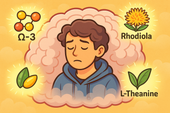
Brain Fog and Body Dysmorphic Disorder: Can Nootropic Supplements Help?
Brain fog often accompanies Body Dysmorphic Disorder, clouding focus and deepening emotional fatigue. Nootropic supplements like L-theanine, Rhodiola, and CoQ10 can help restore mental clarity, balance neurotransmitters, and bring calm energy back to the mind 🌿🧠.
-

How Stress Hormones Like Cortisol May Worsen Body Dysmorphic Disorder
Chronic stress floods the brain with cortisol — the hormone that keeps you on high alert. In Body Dysmorphic Disorder, this chemical overdrive fuels anxiety, distorts self-image, and traps the body in survival mode. Calming cortisol helps restore both peace and perspective 🌿🧠.
-

The Role of Neurotransmitters in BDD—and How Supplements May Help
Neurotransmitters like serotonin, dopamine, glutamate, and GABA shape how people with Body Dysmorphic Disorder perceive themselves. When these brain messengers fall out of balance, perception distorts — but targeted supplements can help restore calm, focus, and emotional regulation 🧠🌿.
-

What Is Body Dysmorphic Disorder? A Deeper Look at the Mind-Body Connection
Body Dysmorphic Disorder (BDD) isn’t just about appearance — it’s about perception. When brain chemistry, trauma, and stress distort self-image, the mind begins to see flaws that aren’t truly there. Healing starts by calming the nervous system and reconnecting mind and body 🪞🧠.
-

Keeping Calm in Competitive Sports: How to Train Your Mind, Body, and Chemistry for Peak Performance
Competitive pressure can overwhelm even the strongest athletes — but calm is trainable. By combining supplements like magnesium, L-theanine, and adaptogens with breathwork and mindset training, you can stay focused, balanced, and in control under any level of stress 🧠🏅.
-

Supplements for Parents Facing Toddler Tantrums: Staying Calm When Little Emotions Run Wild
Toddler tantrums can drain even the most loving parent — but your calm is powerful. With the right supplements like magnesium, L-theanine, and ashwagandha supporting your nervous system, you can stay patient, grounded, and kind, even when emotions run high 🧸🌿.
-

Workplace Stress and Anger Management Support
Workplace stress can quickly turn into frustration — but calm is a skill you can train. By combining supplements like magnesium, L-theanine, and adaptogens with breathwork and mindset tools, you can stay focused, patient, and emotionally grounded no matter how intense the office gets 💼🌿.
-

How to Stay Patient With Family During Stressful Holidays
Holiday gatherings can stir up old stress and test your patience — but calm is possible. With nervous system support from magnesium, L-theanine, and adaptogens, plus mindful breathing and clear boundaries, you can stay centered, kind, and grounded even when family chaos unfolds 🎄💞.
-

Supplements to Keep Calm During Traffic Jams
Getting stuck in traffic doesn’t have to ruin your mood. With calming supplements like magnesium, L-theanine, and ashwagandha, you can train your body to stay relaxed and focused behind the wheel — turning gridlock into a moment of grounded patience 🚗🌿.
-
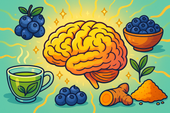
The Role of Antioxidants in Healing Brain Stress from Dissociation
Antioxidants protect the brain from the oxidative stress caused by trauma and dissociation. By neutralizing free radicals and supporting mitochondrial recovery, they help restore clarity, focus, and emotional balance — allowing the mind to heal at the cellular level 🌿🧠.
-
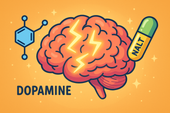
N-Acetyl L-Tyrosine (NALT) for Supporting Mental Clarity
N-Acetyl L-Tyrosine (NALT) fuels dopamine production — the neurotransmitter of focus and motivation. By supporting brain chemistry during stress, NALT helps restore mental clarity, energy, and alertness, making it easier to think clearly and feel present again ⚡🧠.
-

How Ginseng May Improve Focus and Energy in Dissociation
Ginseng helps combat the mental fatigue and fog that often come with dissociation. By supporting mitochondrial energy, balancing neurotransmitters, and regulating cortisol, it gently restores focus, motivation, and emotional presence — helping the mind reconnect with clarity and strength 🌿⚡.
-
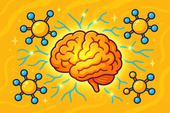
Phosphatidylserine and Dissociation: Supporting Cognitive Function
Phosphatidylserine helps calm the stress response by balancing cortisol, the body’s primary stress hormone. By lowering cortisol spikes, it protects memory, focus, and emotional stability — restoring clarity and mental presence for those struggling with dissociation 🧠🌿.
-
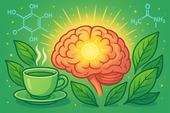
Can Green Tea Extract Help with Dissociative Brain Fog?
Green tea extract may help lift dissociative brain fog by supporting neurotransmitter balance, reducing inflammation, and enhancing energy at the cellular level. With its key compounds EGCG and L-theanine, it promotes calm focus, clarity, and emotional presence — helping you feel more alert and grounded 🍵🧠.
-

Building a Natural Supplement Stack for Dissociation Support
Building a supplement stack for dissociation means nourishing the brain and body back into communication. By supporting neurotransmitters, gut health, and energy balance through nutrients like magnesium, omega-3s, curcumin, and probiotics, you can help restore clarity, calm, and connection — one layer at a time 🌿🧠.
-

Chamomile and Lavender for Dissociative Anxiety Relief
Chamomile and lavender work together to calm dissociative anxiety by soothing the nervous system and restoring emotional safety. Their natural compounds balance cortisol, enhance GABA activity, and activate the vagus nerve — helping you feel grounded, connected, and at peace again 🌿💜.
-
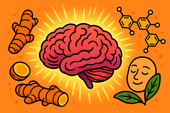
Curcumin for Inflammation and Mental Clarity in Dissociation
Curcumin, the golden compound in turmeric, does more than fight inflammation — it helps clear the mental fog often tied to dissociation. By calming neuroinflammation, balancing neurotransmitters, and supporting mitochondrial energy, curcumin can restore mental clarity, focus, and emotional presence 🌿🧠.
-
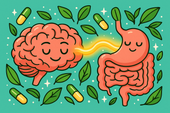
Probiotics and Dissociation: Exploring the Gut–Brain Axis
The gut–brain axis plays a vital role in emotional awareness and presence. When the microbiome is balanced, it supports serotonin production, vagus nerve activity, and calm focus. Probiotics help repair this connection — restoring safety, clarity, and the feeling of truly being in your body again 🌿🧠.
-
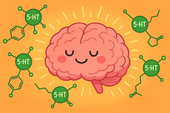
5-HTP for Dissociation: Supporting Serotonin and Emotional Stability
5-HTP helps bridge the gap between emotional numbness and stability by supporting serotonin production — the neurotransmitter that shapes mood, sleep, and sensory awareness. For people experiencing dissociation, 5-HTP may gently restore connection, presence, and emotional balance from the inside out 🌿🧠.
-
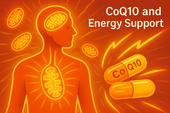
CoQ10 and Energy Support for People with Dissociation
Chronic dissociation often leaves the body running on empty — tired, foggy, and disconnected. CoQ10 helps recharge that system at the cellular level by restoring mitochondrial energy, reducing oxidative stress, and supporting the brain’s capacity to stay present. It’s energy medicine for both body and mind ⚡🧠.

















































